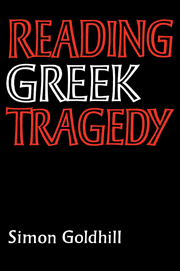Book contents
- Frontmatter
- Contents
- Preface
- 1 The drama of logos
- 2 The language of appropriation
- 3 The city of words
- 4 Relations and relationships
- 5 Sexuality and difference
- 6 Text and tradition
- 7 Mind and madness
- 8 Blindness and insight
- 9 Sophistry, philosophy, rhetoric
- 10 Genre and transgression
- 11 Performance and performability
- Bibliography
- Index
7 - Mind and madness
Published online by Cambridge University Press: 08 February 2010
- Frontmatter
- Contents
- Preface
- 1 The drama of logos
- 2 The language of appropriation
- 3 The city of words
- 4 Relations and relationships
- 5 Sexuality and difference
- 6 Text and tradition
- 7 Mind and madness
- 8 Blindness and insight
- 9 Sophistry, philosophy, rhetoric
- 10 Genre and transgression
- 11 Performance and performability
- Bibliography
- Index
Summary
As if a man were author of himself.
SHAKESPEAREIn Chapters 4 and 5,1 considered how the tragic texts reflected and disputed the ways in which an individual was placed in society, first in terms of family relations and civic ties as expressed through the vocabulary of philos and ekhthros and secondly in terms of the differences between the sexes. These two chapters were placed between a more general examination of the implications for the tragic texts of the contemporary ideology and structures of the city, and, in Chapter 6, an enquiry into the ways in which the Homeric poems provide an important textual background to the workings of Attic drama. In this chapter, I intend to follow this extensive discussion of what might be called the ‘notion of the self’ with an investigation of the related and important topics of ‘character’ and ‘mind’ which have been brought to the fore in recent critical exchanges not only in classical studies, where the tragic texts have long been the objects of a vigorous debate concerning the term ‘character’, but also in modern researches in the philosophy of language, particularly in theories of reading and criticism, where the usefulness and implications for the reading of fiction of the term ‘character’ and the notions of the ‘self’, the ‘subject’ have been the focus of considerable interest.
The tragic texts have often been regarded as constituting a specific and important historical moment in the development of a notion of character.
- Type
- Chapter
- Information
- Reading Greek Tragedy , pp. 168 - 198Publisher: Cambridge University PressPrint publication year: 1986



